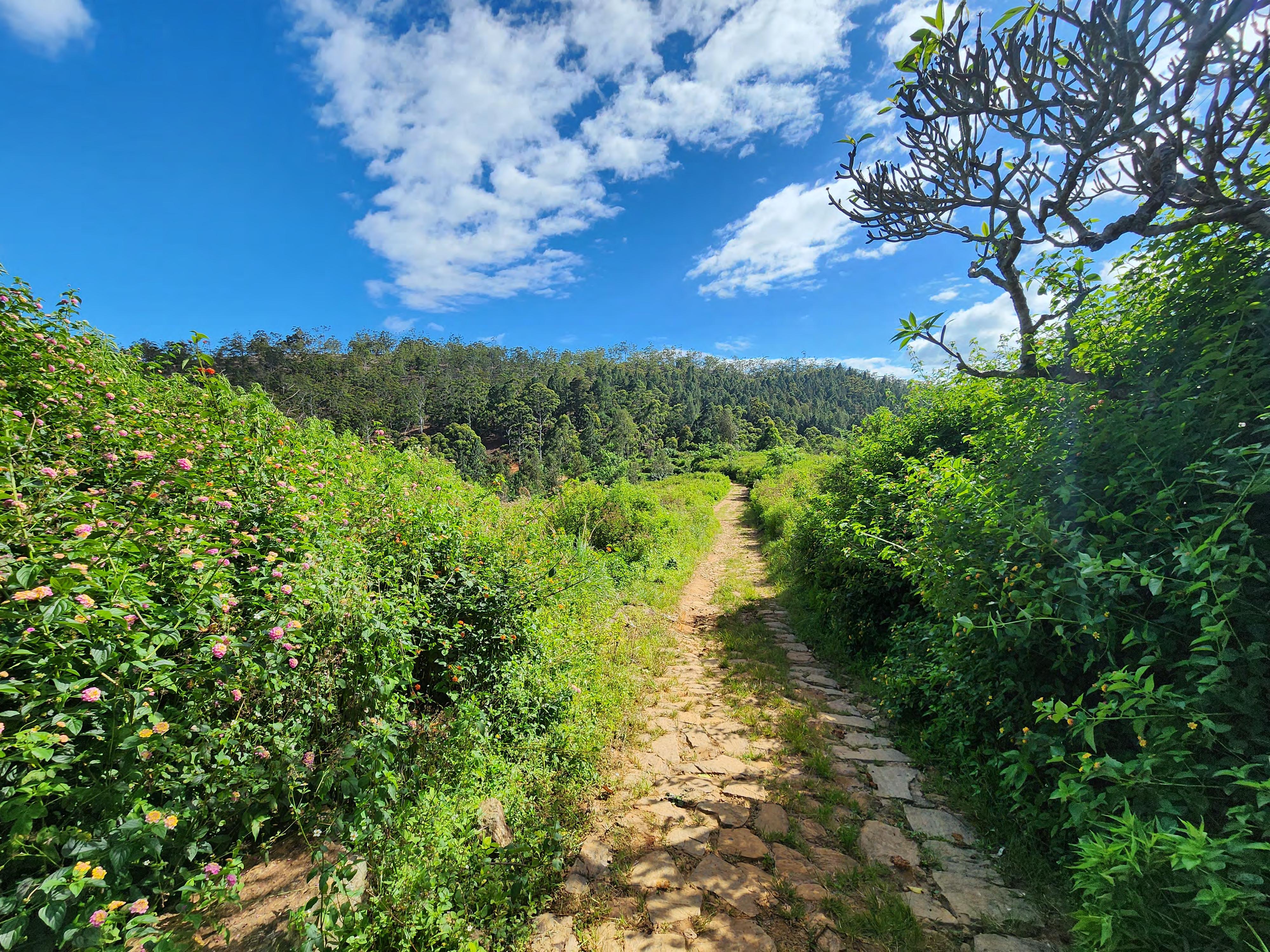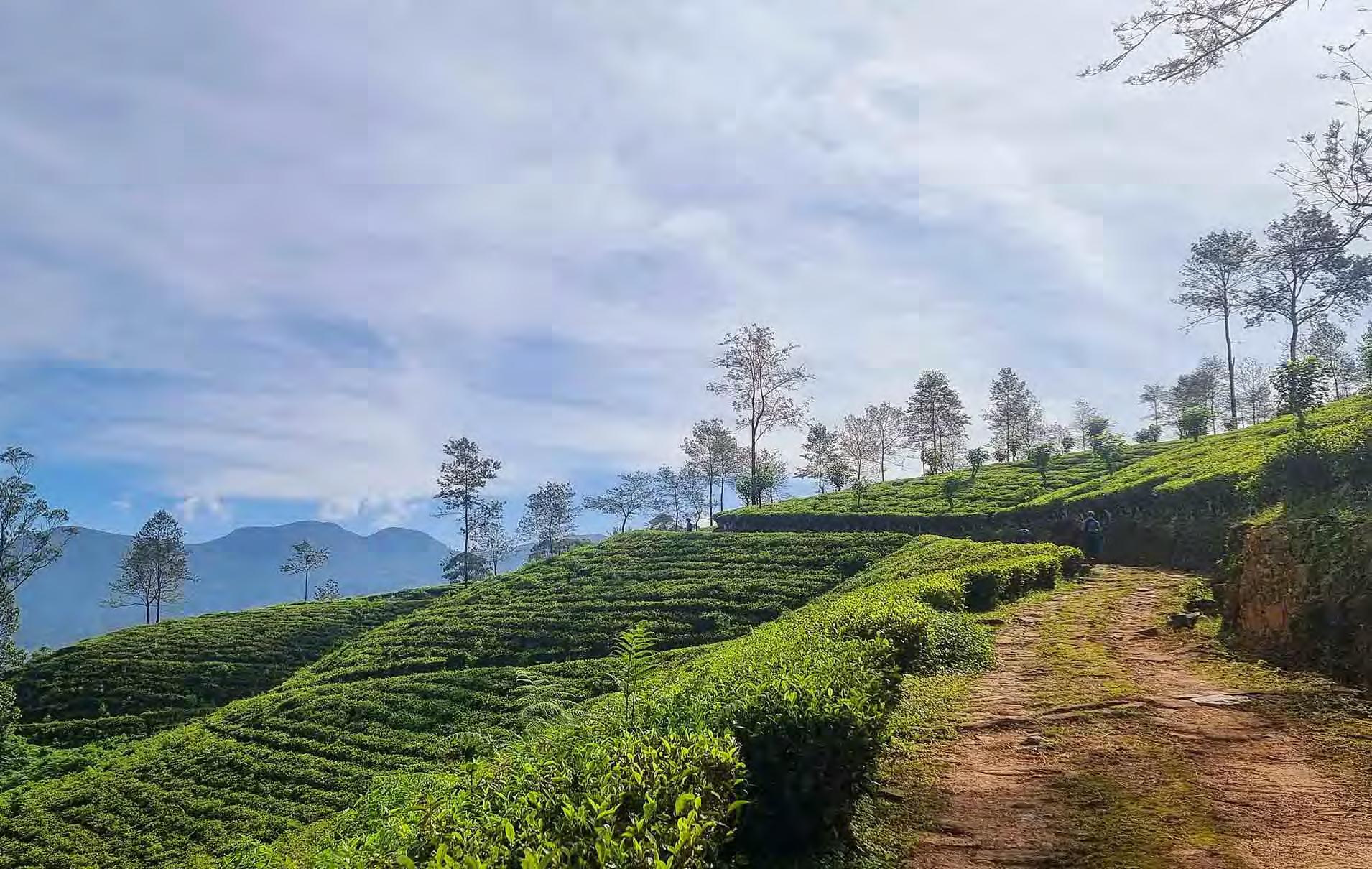
8 minute read
FINDING MY ZEN: THE PEKOE TRAIL
By Miguel Cunat
“We travel, initially, to lose ourselves; and we travel, next to find ourselves. We travel to open our hearts and eyes and learn more about the world than our newspapers will accommodate. We travel to bring what little we can, in our ignorance and knowledge, to those parts of the globe whose riches are differently dispersed. And we travel, in essence, to become young fools again- to slow time down and get taken in, and fall in love once more.”
– Pico Iyer
Sri Lanka, an island steeped in beauty and history, has long captivated travelers with its palm-fringed beaches, lush landscapes, ancient monuments, and the warmth of its people. Yet, despite all its wonders, I always felt something was missing — a way for people to truly connect with the island’s spirit, its hidden treasures, and its resilient communities…
On the Pekoe Trail, nature, simplicity and mindfulness blend together to catalyze transformation, evoking a sense of Zen.
I grew up exploring the mountains of the Sierra de Madrid, accompanied by the unconditional support and inspiration of my family, the Cunat Arias. On those walks I learned that walking is not just a physical act; it is a way to reflect, to find clarity, to build connections.
Back then, I didn’t realize it immediately, but I’d taken my first steps on my path to Zen.
Nature is intrinsic to Zen. Mountains. Rivers. Forests. These are all metaphors for awakening. The trail is your teacher, guiding you to experience the essence of life without word or doctrine. Only through direct experience.
In the Zen tradition, Jikishi (direct pointing) nudges you to bypass the intellect and be totally in the present moment, experiencing reality as it is. It encourages you to peel back layers of interpretation, to reveal the true nature of our existence in its purest, unmediated, and immediate form.
Peel back its layers. The Pekoe Hiking Trail reveals a nuanced landscape –where tea plantations, wildlife corridors and rural landscapes converge. It offers a physical and spiritual journey in alignment with Zen’s principles, particularly direct pointing.
The sights, sounds and smells of the natural world are captivating. It mirrors Zen’s emphasis on direct engagement with reality, but without the conceptual barriers. As you hike, each step grounds you in the present moment.
Like Kinhin (Zen Walking Meditation), every movement is a form of mindfulness.
I walked the Camino de Santiago years ago. It made me realize how a long-distance trail could transform not only how we explore a destination, but also how we feel about it.
When I began exploring Sri Lanka over two decades ago, the central highlands took my breath away. I began to dream of a trail that would weave an enormous tapestry out of the highlands, the plantations, villages, forests and the people who dwell there.
Turning that vision into reality wasn’t easy. It took me over ten years to explore and map the thousands of trail options crisscrossing tea plantations, to determine which route would be most suitable. Endless walks, studying maps, talking to local communities, and understanding the nuances of each region.
Finally, after years of work, The Pekoe Trail was born. At World’s End, I found a new beginning.
This 300km trail is more than just a route through Sri Lanka’s breathtaking tea country — it is a gateway to its soul. It passes through 2 provinces, 25 towns, 80 villages, 24 tea plantations, 8 railway stations, 10 forest reserves, and even a leopard corridor. But what makes it truly special is its ability to take travelers far beyond the well-trodden tourist paths. Whether walking a single stage or the entire trail, hikers discover places and stories that might otherwise remain hidden, creating a deeply personal connection with Sri Lanka.
Every step is a lesson in simplicity, stripping away the noise of urban life. A direct confrontation with the raw, unblemished beauty of pure existence. A deeper connection with oneself and the environment, a voyage within to recover one’s authentic self.
In Zen, nature is a direct pointer to enlightenment. Mountains, rivers, and trees do not preach. They embody truth without words, without judgement. The Pekoe Trail serves as such a teacher. Each tea leaf, forest path and animal points directly to the infinite interconnectedness of all life. The trail nurtures mindfulness by drawing your attention to its terrain. A metaphor for life’s journey – one step at a time, fully present.
The rhythm of footsteps, the rustle of tea leaves, birdsong in the background. The trail invites you to immerse yourself in the present moment. It bypasses conceptual thinking and brings hikers into direct contact with the essence of their surroundings.
Moments of awe — such as cresting a hill to reveal a sweeping tea valley or pausing to witness wildlife — become instances of direct pointing. These moments do not need explanation; they speak directly to the heart and remind the hiker of their place in the natural order.
Hiking integrates the physical with the spiritual. The trail requires effort, patience, and perseverance, echoing the discipline of Zen meditation. Yet the reward is not in reaching the destination but in the act of walking itself — a pure, immediate experience of life.
The Pekoe Trail embodies our interconnectedness, as it weaves through communities, offering encounters with locals that embody humility and simplicity. Each interaction a reminder of our shared humanity and mutual dependence, pointing directly to the value of connection and compassion.


The trail also serves a critical purpose: to support the Ceylon Tea industry at a pivotal moment in its history. For decades, Ceylon Tea has been one of Sri Lanka’s most iconic exports, but economic challenges, shifting global markets, and struggles within plantation communities have put this unique heritage at risk.
Through the trail, the story of tea is revealed in a way that connects travelers to life on the plantations, the hard work behind each tea leaf, and the extraordinary history of an industry that has defined this island. Every step a traveler takes on the Pekoe Trail is an opportunity to generate income and visibility for these communities, helping revitalize the sector while promoting responsible tourism.
The Pekoe Trail was born during a tumultuous time. As the world recalibrated after the pandemic, Sri Lanka faced an unprecedented economic and political crisis. The trail became a beacon of hope. While power cuts stretched for hours, fuel supplies dwindled, and protests filled the streets, we introduced a product that met the moment: a sustainable, low-impact way to explore, an invitation to slow down, and an opportunity to uplift remote communities.

Even as grim headlines about Sri Lanka dominated global news, the trail told a different story. It represented resilience, innovation, and the promise of a better future. It showcased Sri Lanka in a new light, inspiring travelers and restoring faith in the country as a destination.
One of the most rewarding aspects has been to see how it empowers the communities it touches. Many villages along the trail were designed during colonial times to be isolated, with lives centered solely around tea plucking. The Pekoe Trail has changed that narrative. Local men and women, drawing on their everyday knowledge, have become trail guides, sharing their understanding of tea, plantation culture, and the flora and fauna of the region. Here, nature becomes the teacher, a journey that strips away ego and distractions. An invitation to experience reality as it is — through mindful walking, attentive listening, and an open heart.
I will never forget a call from a guide after we conducted a health and safety training program for the trail. He told me that ve of the seven women trained were already leading clients on the trail.
One of them, while guiding her group, encountered her grandparents working in the tea elds. Their pride and joy were overwhelming as they saw their granddaughter hosting foreign hikers and representing her community with such con dence and grace. These moments show that the trail isn’t just about walking — it’s about changing lives, creating new opportunities, and rewriting narratives.
At its core, The Pekoe Trail isn’t just a journey through Sri Lanka’s landscapes — it’s a journey inward. Inspired by the principles of Zen, the trail invites hikers to embrace mindfulness with every step. Walking the trail means slowing down, attuning to the rhythm of nature, and immersing oneself in the present moment.
Whether you’re listening to the wind in the forests, watching the sun dip behind tea-covered hills, or sharing a smile with a local villager, the trail offers a rare opportunity to reconnect —with the land, with others, and with yourself. It is this harmony between adventure and stillness exploration and reflection, that makes The Pekoe Trail not just a path but an experience that lingers long after the journey ends.
Each step on the trail aligns with Zen’s call to return to the moment, where truth resides. In this way, the The Pekoe Trail is not just a physical route but a spiritual practice—a direct pointing to the essence of life itself. With the right support, The Pekoe Trail will continue to transform lives, protect landscapes, and share Sri Lanka’s magic with the world. Together, we can ensure its legacy as a beacon of sustainable, meaningful travel for generations to come.











